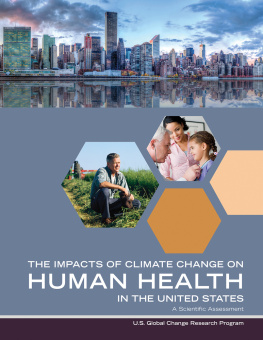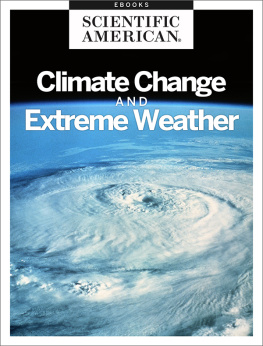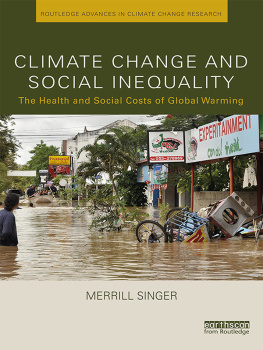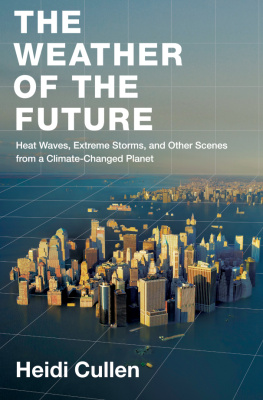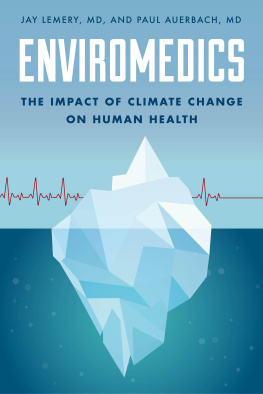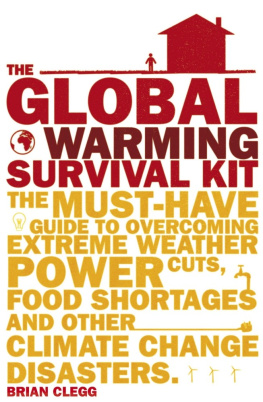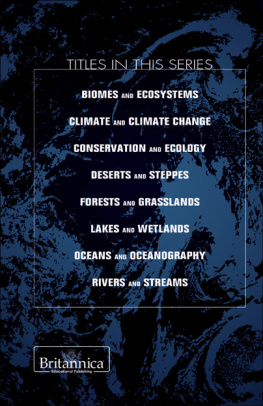Heat Advisory
Protecting Health on a Warming Planet
Alan H. Lockwood, M.D.
The MIT Press
Cambridge, Massachusetts
London, England
2016 Massachusetts Institute of Technology
All rights reserved. No part of this book may be reproduced in any form by any electronic or mechanical means (including photocopying, recording, or information storage and retrieval) without permission in writing from the publisher.
MIT Press books may be purchased at special quantity discounts for business or sales promotional use. For information, please email or write to Special Sales Department, The MIT Press, 1 Rogers Street, Cambridge, MA 02142.
This book was set in Sabon by Toppan Best-set Premedia Limited. Printed and bound in the United States of America.
Library of Congress Cataloging-in-Publication Data
Names: Lockwood, Alan H., author.
Title: Heat advisory : protecting health on a warming planet / Alan H. Lockwood, M.D.
Description: Cambridge, MA : The MIT Press, [2016] | Includes bibliographical references and index.
Identifiers: LCCN 2016004065 | ISBN 9780262034876 (hardcover : alk. paper)
eISBN 9780262335720
Subjects: LCSH: Global warmingHealth aspects. | Climatic changesHealth aspects. | Medical anthropology.
Classification: LCC RA793 .L66 2016 | DDC 613/.1dc23 LC record available at https://lccn.loc.gov/2016004065
ePub Version 1.0
d_r0
To Anne
and my family, present and future
Preface and Acknowledgments
The impetus to write this book arose as I was finishing The Silent Epidemic: Coal and the Hidden Threat to Health. As I wrote, it became clear that there was another, more important story that was larger than one limited to the consequences of burning coalnamely, the effects of climate change on health. Coal continues to exert important ill effects on health during all phases of its life cycle, particularly in countries such as China and India, but the tide is turning. All over the world, ordinary citizens, their governments, and in some cases the power companies themselves all seem to realize that burning coal is not an option if we are to move toward a more sustainable energy future. The once-limiting costs of wind and solar power have fallen precipitously even as some utilities seek to impose restrictive net metering fees on rooftop solar installations.
Utilities that take advantage of the solar option face new challenges. What will they do at night when the sun does not shine? Will a mix of improved battery technology and heat storage technologies fill this void? Or will research and development transform laboratory curiositiessuch as the use of light to split water into easily stored hydrogen and oxygenmature into commercially viable technologies? Wind turbines continue to improve, and plans are emerging to harness the energy of tides, waves, and rivers without building dams.
Chai Jing, a courageous and outspoken Chinese journalist and mother, produced a documentary called Under the Dome that she shows to huge audiences. Its impact was great enough that access to the documentary on YouTube was blocked in China. Now, China has entered into an agreement with President Obama to limit carbon dioxide emissions and has taken steps to initiate a cap and trade policy to control these emissions. Meanwhile, the New York Times reported data from the US Energy Information Administration that shows that the BRIC countries (Brazil, the Russian Federation, India, and China) all generate a larger fraction of their electricity from renewable sources than we do in the United States. Of course, we Americans use much more electricity per capita even as we generate decreasing amounts from coal.
With this information in mind, I approached Clay Morgan, my editor at the MIT Press, about a follow-up to The Silent Epidemic. He and his associates were enthusiastic, and we agreed on a timeline that would see the book in the hands of readers before the 2016 presidential elections. Clay, like me, is now enjoying his retirement, and I am in the capable hands of Miranda Martin, Beth Clevenger, Kathleen Caruso, and their colleagues at the MIT Press. I am particularly indebted to the anonymous peer reviewers whose trenchant comments helped make this a better book. I owe a special debt of gratitude to Melinda Rankin whose invisible copyediting skills improved the style and accuracy of the final text.
The task of writing this book was daunting. Unlike those who made climate science their lifes work, I became a clinical neuroscientist. In many ways, the research challenges I faced prepared me for the task I have undertaken. Success depended on reading trusted sources as widely as possible, making evidence-based decisions, resorting to clinical and scientific judgment when necessary, and moving ahead. I envy writers like Elisabeth Kolbert and others whose well-deserved stature enabled them to obtain support for their work, some of which has influenced mine. Kolbert was able to travel extensively and visit scientists as they worked. I traveled with my computer to the amazing library at the University at Buffalo where helpful librarians were usually able to provide me with papers from other repositories. It was rare to wait more than a day for a loan request to be fulfilled.
I am indebted to a great many individuals whose work I have relied on extensively during the course of writing this book. First and foremost are the authors of the peer-reviewed scientific publications that have provided what I hope is a solid, data- and evidence-based approach to my topic. Many of these authors have been extraordinarily helpful by giving permission to reproduce their work and sending me copies of papers not readily available at the University at Buffalo along with other relevant publications. The numerous scientists who contributed to the Intergovernmental Panel on Climate Change Fifth Assessment Reports have been a constant inspiration and unlocked the doors to important lines of inquiry that are not a usual part of a neurologists training and experience. I am indebted to the often-nameless scientists who performed herculean work as they wrote, fact-checked, and reviewed reports published by governmental agencies such as the Environmental Protection Agency, the US Department of Agriculture, the US Energy Information Administration, and others. Although I have tried to rely on the peer-reviewed literature whenever possible, many outstanding organizations, including Physicians for Social Responsibility (PSR), the Sierra Club, and the Natural Resources Defense Council, have made important contributions. Earthjustice receives special thanks for its work and support.
Who cant help but be inspired by the following sources? In no particular order: James Balog, the genius behind the documentary Chasing Ice; Elizabeth Kolbert, author of The Sixth Extinction, a book that everyone should read; Al Gore, whose AnInconvenient Truth reminds us how to use the bully pulpit; and Bill McKibben and all the good people at 350.org. If James Hansens voice had been heeded, this book would not have been necessary. There are scores of others that served as a source of ideas and inspiration.
During my rewarding and varied career as a physicianscientist, I learned to cherish the value of evidence-based decision-making. I try as hard as possible to be aware of sources of bias that affect thinking and behavior. I ask the same of others as we undertake the formidable task of planning for the future we want for our children, grandchildren, and the others who will follow us and who must live with the choices we make today. This generation may be the last one that has any hope of mitigating what some refer to as an impending climate change public health disaster or, from a decidedly more optimistic perspective, the opportunity to deal triumphantly with this public health opportunity. There are many win-win, no-regrets choices to make if we have sufficient wisdom to do so.


